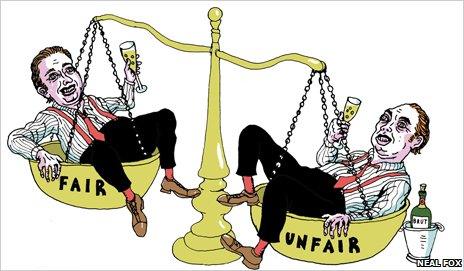Is it fair to pay bankers big bonuses?
- Published

It's bonus season for bankers, including at banks bailed out by taxpayers. Is this just? Great thinkers like Aristotle have mulled such questions for centuries, says philosopher Mark Vernon.
Is it fair and just to pay bankers big bonuses?
You can seek an answer in three different ways, according to the three traditions of moral philosophy that dominate in our times, which are also explored in .
The first answer can be summed up in a word: happiness.
It's associated with the British philosopher Jeremy Bentham, who argued that if you want to know the right thing to do, ask yourself what will increase the happiness of most people, and decrease pain.
Is it the size of the bonuses paid to bankers that so riles the public? The utilitarian could stress that growth, wealth and GDP contribute much to the happiness of all. These depend upon a functioning banking system.
And banks, in turn, need investment bankers to turn a profit. If those bankers are best incentivised by the promise of large bonuses, then so be it. Indirectly, that makes everyone happier.
The utilitarian would also consider the amount of outrage and unhappiness that large bonuses generate in the population at large. There may come a point when the happiness generated by profitable banks outweighs the unhappiness of protests at the bonuses.
But then again, banks are so fundamental to our economy, and the economy is so fundamental to our happiness, that it seems unlikely this tipping point will be reached - as indeed the British government seems to have concluded.
The second tradition might come to a broadly similar view, but for different reasons.
The tax take isn't enough to head off protests
It too can be summed up in a word - dignity - and is associated with the German philosopher Immanuel Kant.
The starting point now is respect for the rights of investment bankers. They are protected by their contracts of employment, and those contracts state that they should be paid large bonuses when their efforts generate profits.
Further, the bankers secured their jobs in a free market, one that others are perfectly at liberty to enter too.
So, if you think bonuses are wrong because you miss out as a result - perhaps by having to pay more taxes - then one answer would be, change your career. The City awaits you too.
Only that doesn't seem very satisfactory. Not everyone can be a banker.
Further, banks exist to serve the community. They are supposed to hold our money and lend it out, in order to facilitate the process of wealth generation - wealth that is for the good of all. This is to say that large bonuses offend our sense of the common good.
So this leads to the third answer, which is encapsulated in a word too: virtue.
The ancient Greek philosopher Aristotle argued that justice is as much about the place you live in, and whether everyone can live in it well. It's called the common good. So, whether or not the common good is served by large bonuses is an issue to consider, according to him.
Another is to think of the virtues that bonuses instil in the bankers. Do bonuses make them better bankers?
It could well be argued that excessive incentives cloud good judgement, which the good investment bankers needs. Rather, they breed greed, a fault that arguably contributed to the banking collapse of 2008. If you follow this logic, then bonuses should be cut.
Three arguments, then.
Does paying large bonuses increase everyone's happiness, because the banks do well? Should we respect the rights of the bankers, who are owed the cash?
Or do we need to think more about the common good, and what banks are for?
Mark Vernon, the author of Philosophy For The Curious and Ethics For The Curious, will tackle more modern dilemmas throughout the week. Tomorrow, should Christian B&Bs accept gay couples?